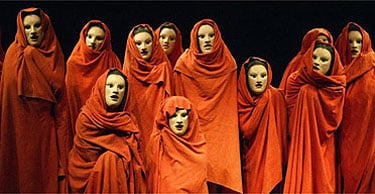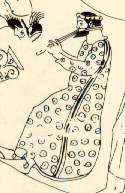Choral Drama (meaning more than one voice) was born out of Greek Theatre. Greek theatre evolved from ritual and dance with a  strong choral focus. The choral parts in Greek theatre were used to emphasize the dramatic action. The ‘choric dithyrambs’ (choral songs) were originally about death and resurrection of Dionysus (god of wine and fertility).
strong choral focus. The choral parts in Greek theatre were used to emphasize the dramatic action. The ‘choric dithyrambs’ (choral songs) were originally about death and resurrection of Dionysus (god of wine and fertility).
The Chorus served a variety of purposes within the drama:
The first function of the chorus was as narrator (telling stories, and providing background information).
When the ‘first’ actor stepped out of the chorus and assumed a role, the chorus could also assume a role (for example, if the actor who stepped out was playing a god, the chorus could become his worshippers).
The Chorus could work within the action as characters.
Or the Chorus could work from outside the action as impartial commentators. The chorus was the ideal spectator. It provided  commentary and questions, gave opinions and warnings, and clarified experiences and feelings of characters in everyday terms. The chorus sympathized with the victims, reinforced facts, separated episodes, and often served as spokespeople for the conservative members of the community. The chorus would bridge the gap between audience and players and intensify the emotions of the dramatic action.
commentary and questions, gave opinions and warnings, and clarified experiences and feelings of characters in everyday terms. The chorus sympathized with the victims, reinforced facts, separated episodes, and often served as spokespeople for the conservative members of the community. The chorus would bridge the gap between audience and players and intensify the emotions of the dramatic action.
Function of the Chorus
- Maintain a sense of ceremony and ritual
- Establish a lyrical mood through rhythmic chanting and dance
- Reinforce the passions of the dramatic action
- Connect the audience and the actors by making responses and asking questions
- Unite music, dance, and speech to connect dramatic episode
A note about the use of music and dance: The chorus can punctuate the action of a play with bursts of song and choreographed dances, which enlarged the dramatic action and relieved tension (much like musical theatre productions today). The instruments used to accompany choric songs and dances included flutes, lyres, horns, drams and bells.
